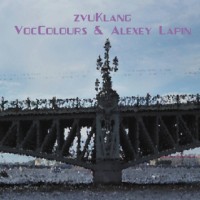VocColours + Alexey Lapin: Zvuklang
Author: Ettore Garzia
http://ettoregarzia.blogspot.de/2013/12/voccolours-alexey-lapin-zvuklang.html
The memory of Luciano Berio and his musical concepts are a leit-motiv that recurs often in this blog recently. Especially with regard to the vocal, Berio remains a light, the real change!
Without him there wouldn’t have been a real turning point in the large receptacle of avant-garde theater and opera. With Berio began the process of analyzing the powers of the voice wherever it was in the world.
The German vocal quartet, VocColours, is based precisely on the set of relations of the voice compared to the feelings to be expressed. In this work for Leo R., the VocColours (Norbert Zajac, Brigitte Kupper, Gaia Hummel, Iouri Grankin) are accompanied by Russian pianist Alexey Lapin: an ambiguous assortment for many people, but perfectly natural when viewed in the name of music and the universality of man. So, in the internal notes.. «…Germany and Russia are known to have been in a complicated relationship since time immemorial and certainly there were some cultural repercussions of that fact. But this album, if anything, is a glorious example of another line of thought….».
The universality of thought is found precisely in the music: the voice can be related with our feelings, rather it is the vehicle for expressing them, although often we believe that there may be a split between spirit and intellect; and this universality of thought knows no national borders.
In this cd I would say that the work on vocal methods is geographically complete: we start from Berio and the experiences of contemporary European theater, then, we are transferred to the exteriority of vocalese jazz, and we have to take into consideration remnants of Americanness through armored impulses on vocal forms of the native Americans or on the biological forms of McFerrin’s voice, as well as we perceive shadows on Russian traditional singing and Eastern chant. The comprehensive approach is clearly condensed, and perhaps a great business card of what I mean in this sense might be «Hey ho» (track n. 2). The intervention of the great Russian pianist is used for a wise creation of atonal or surreal atmospheres (with piano preparations) that give an artistic flavor more complete.
«Zvuklang» is something that my words can make seem chaotic, but whose listening «soundly» refutes the confusion, highlighting a valuable project and some highly trained musicians.
__________________________________________________________________________IT
In questi giorni su questo blog ricorre spesso il ricordo di Luciano Berio e delle sue concezioni musicali. Specie per quanto riguarda la vocalità, Berio rimane un faro, il vero cambiamento: è grazie a lui che nella nuova panacea avanguardista, riunita nel teatro, si è creata una svolta effettiva e si è cominciato ad analizzare i poteri della voce in tutte le parti del mondo.
E’ proprio sul gioco delle relazioni della voce rispetto ai sentimenti che si pone il lavoro di questo quartetto vocale tedesco, i VocColours (Norbert Zajac, Brigitte Kupper, Gaia Hummel, Iouri Grankin) accompagnati dal pianista russo Alexey Lapin: un assortimento ambiguo per molti ma perfettamente naturale se visto in nome della musica e dell’universalità dell’uomo. Così nelle note interne… «…Germany and Russia are known to have been in a complicated relationship since time immemorial and certainly there were some cultural repercussions of that fact. But this album, if anything, is a glorious example of another line of thought….».
L’universalità di pensiero viene trovata appunto nella musica: la voce può essere messa in relazione con i nostri sentimenti, anzi è il veicolo per esprimerli, nonostante spesso si creda che ci possa essere una frattura; e l’universalità di pensiero non conosce i confini nazionali. Qui il lavoro sulla vocalità è direi geograficamente totale: partendo da Berio e dalle esperienze del teatro contemporaneo europeo, si trasborda nelle esteriorità del jazz vocalese, prendendo in considerazioni scampoli di americanità attraverso pulsioni «blindate» sulle forme vocali dei nativi americani o quelle biologiche di McFerrin, nonchè arriva un’ombra sul canto tradizionale russo ed orientale. L’impostazione complessiva è chiaramente condensata, e forse un ottimo biglietto da visita su quello che voglio dire in tal senso potrebbe essere «Hey ho» (la traccia n. 2). Lapin, dal canto suo, si limita a creare saggiamente le atmosfere con tocchi pianistici che rimbalzano dall’atonalità alle preparazioni interne al piano.
«Zvuklang» è qualcosa che dalle mie parole può sembrare a voi caotico, ma il cui ascolto smentisce sonoramente quella confusione, mettendo in evidenza un progetto validissimo e dei musicisti preparatissimi.
